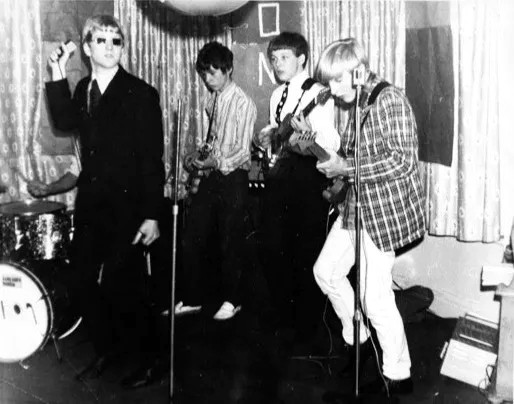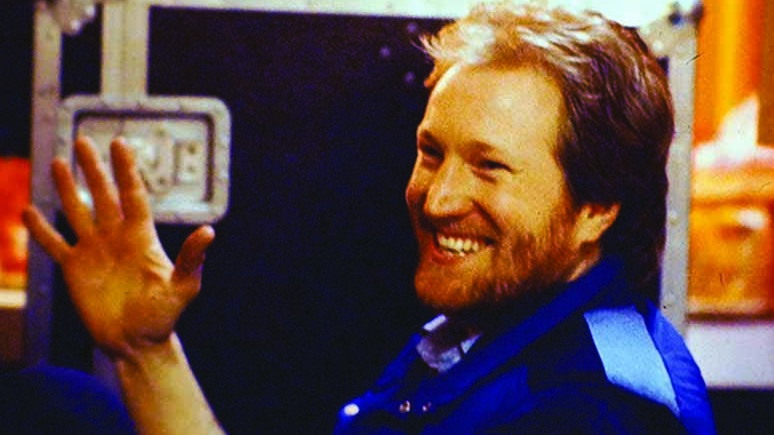Before Genesis became the iconic progressive rock band we know today, its roots lay in two school bands at Charterhouse School: Garden Wall and Anon. Among these, Anon brought together the talents of Anthony Phillips, Richard Macphail, Rivers Jobe, Rob Tyrrell, and a young Mike Rutherford. On December 16, 1965, Anon performed their first live gig—the humble beginning of a legendary musical journey.
Continue reading “The Genesis of Anon: Their First Live Gig on December 16, 1965”Genesis: The Early Years Through the Eyes of Richard Macphail
Richard Macphail, a beloved and influential figure in Genesis history, passed away unexpectedly on August 27, 2024, at the age of 73.
Before they became a household name synonymous with prog rock innovation and some of the most iconic music of the 1970s and 80s, the band Genesis was a group of young men trying to find their sound, their place, and their future in the music world.
This essay offers an insider’s perspective on these early days by Richard Macphail, close friend, tour manager, and roadie for the band during their formative years. Here’s to you, Richard. Thank you for everything.
The Seeds of Genesis
The story of Genesis truly begins with one man: Richard Macphail.
At Charterhouse School, Richard crossed paths with Rivers Jobe, a bass player who introduced him to the world of music, and more specifically, to Anthony Phillips, a key figure in the early Genesis lineup. This introduction led to the formation of a band named Anon, which included Mike Rutherford on guitar.
‘At Charterhouse, I met a guy called Rivers Jobe, who was way ahead of us all. He went on very early to become a professional bass player,’ Richard recalled. It was through Rivers Jobe that Richard Macphail found himself behind a drum kit, despite realizing quickly that drumming wasn’t his forte. Instead, his role shifted to vocals, a position he felt more comfortable with.
Early Rehearsals and the Birth of Anon
At Richard’s first visit to Anthony Phillips’ house in Putney, the furniture was pushed aside to make room for music equipment: ‘I was astonished to find that the dining room had been converted into a rehearsal space.‘ After the summer holidays, Anthony Phillips also joined Charterhouse School. Together with drummer Rob Tyrell, a friend of Ant’s, they formed the band ‘Anon’, playing mostly Rolling Stones covers at parties and local dances.
Mike Rutherford, another Charterhouse student, joined Anon after connecting with Ant Phillips over their mutual love of guitar. Despite challenges like strict housemasters and other school obligations, the group managed to hone their skills and pull together own material. The first member to bring in an own song was Ant: a track called ‘Pennsylvania Flickhouse’.
‘Ant was way ahead in terms of composing’, Richard Macphail remembered. The Anon booked an hour of studio time at Tony Pike’s Sound in Putney: ‘We piled all the gear in Ant’s mother’s Mercedes and got on a bus and I thought ‘An hour, on my God, what are we gonna do with a whole hour? Each song’s three minutes long, that means we’re gonna get about nine songs done.’ We just got one done and we had huge rails with Mr Pike because everything was of course too loud and he said ‘You’re gonna ruin my equipment!’, all that classic stuff that went on in those days in recording studios.’
This time was the true beginning of what would eventually evolve into Genesis.
Genesis is Born
As members of Anon left Charterhouse and pursued different paths, the remaining members, including Mike Rutherford and Anthony Phillips, joined forces with Peter Gabriel and Tony Banks, leading to the formation of Genesis. Jonathan King, a Charterhouse alumnus, discovered the band after hearing a demo recorded by Brian Roberts, another Charterhouse student. King was impressed enough to produce their first album, From Genesis to Revelation.
In 1969, as the band members faced a crucial decision about their future, they took what we would now call a ‘gap year.’ During this time, they found themselves with their third drummer, John Mayhew, in an empty cottage owned by Richard Macphail’s parents: ‘Coincidentally, my parents had a cottage near Dorking in Surrey, quite remote, but only an hour from London. It was empty and they were going to sell it. They wanted to wait till spring and they let us use it. My dad worked for Rank Hovis McDouggal, he got us an old bread van and that’s how it all kicked off. That was the summer of ’69–’70, where we did our getting it together in the country thing.‘ Also, Richard’s sister had married a scientist who built him a stereo amplifier with headphones. Thus, he was able to play the band new, experimental records in stereo, which influenced them hugely in their own songwriting.
This period was pivotal, as it solidified the band’s commitment to their music and each other.
The Creative Process and the Making of Trespass
Despite their growing cohesion, the band experienced turbulent times. Richard Macphail was the sixth member, trying his best to nourish his guests with pretty basic food. ‘Mike Rutherford once said that if it wasn’t for me, they would have killed each other,’ he recalled, highlighting the intense personalities and creative differences that frequently caused friction. However, this tension also fueled their creativity, leading to the evolution of their signature sound.
During that time at ‘Christmas Cottage’, as they called it, the band wrote their second album Trespass, which included songs like ‘Stagnation’ and ‘The Knife.’ Richard recalled watching Peter Gabriel write the lyrics to ‘The Knife’ and being struck by the violent revolution described in the song—an interesting contrast to Peter Gabriel’s typically shy demeanor.
The creative process at this time was organic and collaborative. ‘Everyone brought their bits to the party,’ Richard explained. This method of piecing together various musical ideas became a hallmark of Genesis’s style, particularly evident in later works like ‘Supper’s Ready’.
Turbulence and Transformation
With the bread van, the band began touring the UK in 1969/1970. At these early gigs, Peter Gabriel was very nervous as frontman, so much that he sometimes forgot the lyrics and more than once, Richard Macphail had to step in and do the announcements. During their gigs, Richard Macphail also proved to be the problem-solver: One time, a little later, when they had a Mellotron, they could not get the instrument up the stairs of a venue. Thinking they had to cancel the show, Richard just sawed off the banisters to solve the problem.
One of the major challenges came when Anthony Phillips, a cornerstone of the band, announced he was leaving due to stage fright and health issues in the summer of 1970. ‘It was a serious question as to whether they would go on,’ Richard remembered. In a crucial meeting at the back of their van behind the Marquee Club, Rich urged the remaining members to continue. Thankfully, they did, and the search for new members began.
The Arrival of Phil Collins and Steve Hackett
The introduction of Phil Collins as the drummer and later, Steve Hackett as the guitarist, marked a turning point for Genesis. Phil Collins, who Richard described as ‘unbelievable‘ in his drumming abilities, transformed the band’s music with his dynamic style. ‘I never could have imagined in a million years the difference a drummer could make,’ Richard reflected.
Steve Hackett’s arrival completed the classic Genesis lineup. Although more introverted than the others, Steve Hackett’s musical prowess, particularly his love for the 12-string guitar and his brilliant lead guitar skills, meshed perfectly with the band’s evolving sound. ‘It really went clunk with that,’ Richard Macphail said, noting that this lineup would go on to produce some of Genesis’s most celebrated work.
A Band on the Brink of Greatness
By the time Genesis released Trespass in October 1970, they had overcome significant hurdles, including lineup changes and internal conflicts. The band was now poised on the brink of greatness, with a lineup that would soon produce some of the most innovative music of the 1970s. Richard Macphail was an important figure during that crucial, formative period of growth, experimentation, and transformation. Richard Macphail helped Genesis laying the groundwork for their future as prog rock pioneers. Thank you Richard.
Richard Macphail: 17 September 1950 – 27 August 2024.
Title photo: Richard on the cover of his book My Book of Genesis



